Socrates, Plato, Descartes, Bacon, Locke... If they could have collaborated, what would they say?
Mirror Mirror on the Wall, Who’s Most Epistemologically Enlightened of them all?
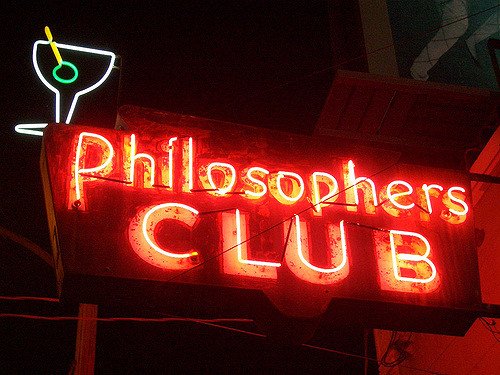
How do we gain knowledge? This disputed question has been asked since the time of the first “thinking” men, the first philosophers. Great scholars of their respective times like Socrates, Plato, Descartes, Bacon, and Locke, have all thought about this issue regarding origin of thought. However, they were never able to collaborate in real time and think together on the issue. Today I tell you, they are all very well acquainted with each other, as they are mostly colleagues and contemporaries; the majority work side by side at the same university, teaching courses in philosophy. Socrates and Plato though, decided to give up their university positions and open up a bar nearby to serve the students and faculty. Socrates felt that this was more fulfilling than lecturing; walking around and mingling with other intellectuals on a much less formal basis felt right to him. He even loves filling in as bartender on most nights just to talk and ask questions, creating a lively atmosphere of philosophical debate. This was not your ordinary bar, but just as its name "En Sophia" implies, it was a place for intellectuals to have libation and socialize “in wisdom”. This night was also not your ordinary night; it was the Friday before spring break, and now that Locke, Descartes, and Bacon had no urgent grading or work to do, they promised Socrates that they would come by the bar, and heeding his words, “Beware the barrenness of a busy life,” take the time to sit together without the hustle and bustle of the professor’s lifestyle. They differed on almost every issue in the book, from epistemology to religion to government. Yet these thinkers agreed to set aside everything and meet so that the three of them could hash out their differences, and possibly formulate a common epistemological ideology; the following is record of that night. The clock strikes 9, Francis Bacon walks in with John Locke lightheartedly talking about their last classes.
Bacon: You wanna’ hear something funny Locke? So we started reading excerpts from The New Atlantis in class today and I could tell they were just so lost and unprepared. I gave them an assignment on it for the break.
Locke: Yea that is a good read, I’m sure they’ll enjoy it.
Bacon: See that’s the thing, I highly doubt they’ll even understand it. The whole time I tried to have them relate certain aspects of it to the world today, maybe experiments on fish, or this American ideal of dominion over all of nature, but nothing… they just stared back blankly. It’s all this scientifically modified garbage they’re eating, I swear, its making them lose their ability to think! I mean come on, I wrote that over 400 years ago, but it’s pretty clear to most of us “enlightened” ones, that the world of Salomon’s House directly mirrors the world we live in today.
Locke: Surely the way you’re constantly ranting and campaigning about it, one would expect them to have understood by now, haha. However, I must say it is a bit uncanny how much of that has already come true with today’s scientific advances. Tell me Frank, did you really believe all of that would happen? Or was this just a lucky twist of fate?
Bacon: Well I would’ve never imagined it all to happen the way it has, with such accuracy; however, with the perfection of the scientific method, through Rene and mine’s work, it was only a matter of time, I guess, before these types of things occurred…
Socrates walks over to them greeting them as they are seated. Bringing a few beers with him, he joins them for a minute and begins to tell them of a peculiar patron who came in the other day:
Socrates: So he started asking me questions about some cave. I guess he must have seen the confusion in my face because he immediately asked “What? Is something wrong teacher? Is my Socratic Method of questioning not up to standard or something?” So I assured him “no my son, I just have no idea what you are talking about. Let’s figure this out, allow me to ask you this…” So I asked where he heard of this story, and he told me it was in your class John!
Locke: Haha yes, we did study it a few days ago, I guess he didn’t catch on though.
Socrates: Well I asked him where it was written. He said in a work called The Republic. I knew that was Plato’s work obviously, but just for laughs I wanted to play things out, so I asked “And… who’s it by?” He answered Plato, so with a smirk I looked over to the back office and pointed at Plato. “There you go lad, I honestly never verbalized that allegory; he did. And if he tries to attribute any more of these crazy ideas to me, just call him a liar for me please, he likes to do that at times. Besides, it couldn’t be mine, after all, I KNOW NOTHING!”
The whole table broke out in hysterical laughter. Bacon, who was just drinking his beer, upon hearing Socrates’s punchline, ended up spilling half of it on his scarf, his fancy scarf, the one that was made to look like one of those old British ruffs he used to wear so often. Just then walks in Descartes, smiling as he observes the laughter.
Descartes: What’s so funny guys? Oh God Frank, spilling beer already? How long have you been drinking? There’s no way we’re going to get any work done if you’re already a few beers in dude. We all know what ends up happening; Locke has to carry your drunken ass home as you yell and rant “Americans are sooo smart they can change nature! They ‘make them also by art greater much than their nature; and their fruit greater and sweeter, and of differing taste, smell, color, and figure from their nature’ (Bacon, The New Atlantis). You’re making us all into one big science experiment!”
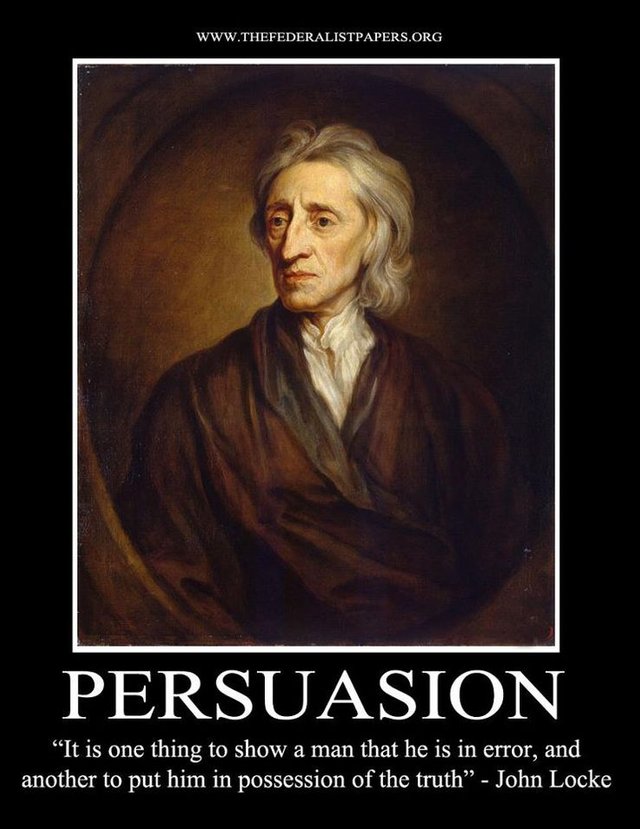
Bacon: Hey! That stuff is all true and you know it Rene!
Descartes: I agree you may have a point, however, can you really blame them for these scientific advances? I mean, I may have helped pave the way, but ultimately it’s your contribution that gave us the contemporary scientific method! Plus, no one ever gets any real credit for it but you, so live with it bud.
Locke: Alright there buddy! Let’s stop the ‘Bacon-bashing’ and get down to business. Socrates gets up and heads towards the bar again, telling the group to be civil and that he’ll be back to check on them later. Descartes digs into his bag and pulls out his laptop, pulling up a scene from The Matrix.
Descartes: Alright guys, so what makes you both so sure that this is all real? What if we were all just like that: sitting in some chair somewhere, hooked up to a huge server, physically doing nothing at all. Wouldn’t that mean that everything we know…everything we’ve sensed…everything we’ve learned… is a lie?
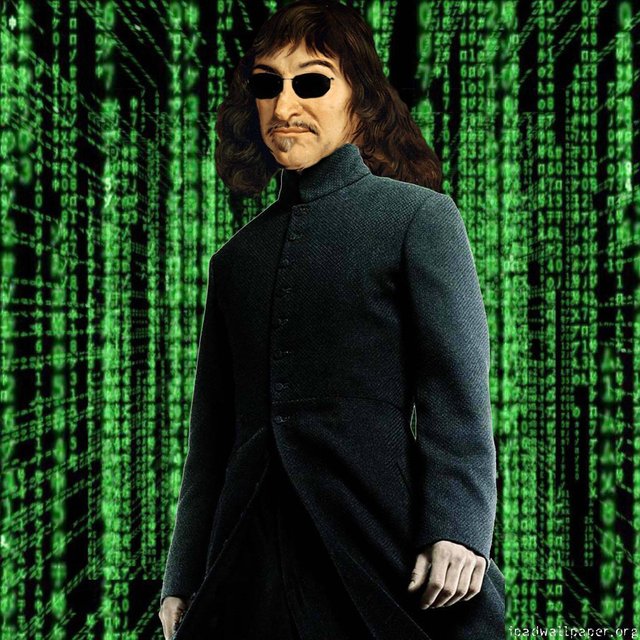
Bacon: Oh stop with the hypotheticals Rene. Clearly that’s not the case, we can see and touch everything around us, so we know we are physically real.
Descartes: Oh how naïve of you Frank. If you had paid any attention at all while reading my work, you would have known that I disposed of such a very argument centuries ago; “I have noticed that the senses are sometimes deceptive; and it is a mark of prudence never to place our complete trust in those who have deceived us even once” (Descartes, 60). If you trust your faulty senses to bring you to such conclusions, then you are nothing more than an imprudent fool!
Bacon: (Jumping out of his seat and wagging is finger in Descartes’s face) you know if we were back in England and you said such a thing, we would be dueling at dawn! Socrates then hears the two getting loud and walks over to see why things are escalating. He sits Bacon back down, looking at Locke and shaking his head, reminding him that he’s the mature one and that he should be able to control the other two better.
Socrates: Ok ok! So what’s the big deal anyways Frankie? Is what he’s saying so wrong? I mean I know a certain writer and a certain allegory that might agree with him.
Bacon: Oh yea? And which one is that?
Socrates: (Chuckling) it has something to do with a cave I think… You know those prisoners thought that what they were sensing was all there was. Those shadows on the wall were truly all that was their reality. They’re senses, though mitigated by their circumstance, clearly deceived them. Don’t get me wrong, as Plato and I would agree, sensory input is necessary to learning and retrieval of knowledge. Yet, the senses clearly do deceive us, like they did those prisoners, on a daily basis. I must agree with Rene, all we know, was already known to us before birth, just stored away deep due to the trauma of birth; so yes the sensory stimuli…or getting asked a series of questions (Smirks)… Is necessary to remember and recall that locked away knowledge, but it does not produce or create the knowledge. Anyways, (as he sets a fresh pitcher on their table) don’t take my word for it, I mean seriously, you know… that I know…that I know nothing! (He walks away laughing merrily).
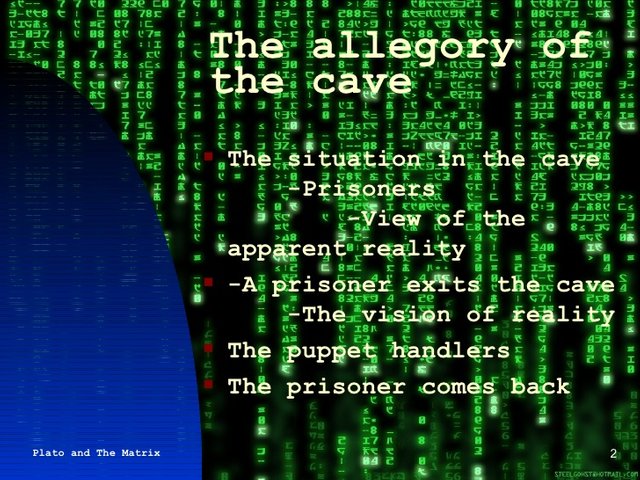
Descartes: Alright fine think of this then guys- MATH! Things like math and geometry are logical, and need no experience whatsoever. Whether or not a demon exists that skews the logical reality of their meaning is separate story haha, but regardless he would need to be deceiving us on a mental and spiritual level, because such logic as math requires no sensory or bodily input to be rationalized. A man who has never done math in his life, as long as he can count in English, knows that 2+2=4. He has never seen those numerals or symbols in his life, yet he can count 2 objects and another 2 objects and know that must total 4. Therefore, our logical, rational, and basically infallible mind must exist totally separate from our body’s faulty senses and “From this we are prompted to acknowledge that the natures of mind and body not only are different from one another, but even, in a manner of speaking, are contraries of one another” (Descartes 54).
Bacon: Ok I understand all of that, but let’s take a different look at this. You are so fond of these new scientific advances and such, which are only made possible through the knowledge gained using the scientific method, as you yourself already claimed. And that scientific method is based almost entirely on our sensory observation. “Hence it is that speculation commonly ceases where sight ceases; insomuch that of things invisible there is little or no observation” (Bacon, Novum Organum). Our senses are what cause us to wonder and speculate in the first place, therefore, without them, knowledge is impossible to be grasped.
Descartes: Fine, I’ll concede that Frank. However, “scientifically” let us look at a candle, like the one I stared at for days at a time. When it melts, it loses much of its physical volume, and much of its ability to be seen or observed. However, we know as Newton, a contemporary of yours from your own alma mater, states, matter does not just vanish, it is neither created nor destroyed. So our eyes deceive us into thinking that candle is gone, correct? However, there is something left to it, there must be. A gaseous form? Its essence maybe? Locke why are you so quiet? You clearly haven’t had enough beer, come on catchup!
Locke: Well there’s not much to say really, besides I didn’t want to get in the middle of you two for fear of getting yelled at or assaulted! I understand where you’re coming from though Rene, but Francis is right in my opinion; his ideas align with mine. I mean I believe we are a blank slate at birth, as I’ve said before; and therefore, knowledge cannot precede observation.
Just then from the next table over, John Watson, the well-known behaviorist psychologist turns his head.
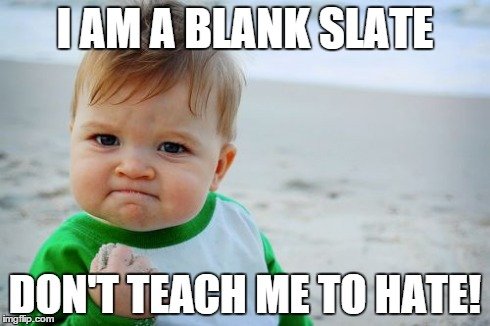
Watson: Tabula Rasa? Yea that totally makes sense. Why do you think I told everyone if they gave me 10 babies from whatever backgrounds they want, that I could make any 5 of them geniuses and doctors and lawyers, and the other 5 thieves and common criminals? People got mad for some reason, so I had to pull back on it, but I still believe it’s possible! And that’s because we are all products of our environment, an environment which acts on our knowledge through our senses. Watson turns back to his table. He’s sitting there with John Piaget, Sigmund Freud, and Lev Vygotsky. But their debate is one for another time; in fact it got so heated that the burly Socrates was forced to bounce them after repeated warnings and suspicion of Freud’s cocaine use.
Locke: Okayyy… as I was saying before I was interrupted… honestly this argument doesn’t seem to be getting anywhere fast and its getting late. I have a question for you guys though, I need to ask it before you guys get heated and start arguing us back into this epistemological black hole we’ve created. Do you all really believe that because the founding fathers were inspired by my words, that this was my vision of government? What this country has today?
Bacon: I mean yea?
Descartes: Yea man it’s pretty awesome that you made such an impact.
Locke: Ugh, clearly giving you my treatises was futile. The founding fathers may have had the right idea, but what the government has become, this all powerful, overreaching force that works against the people at times, was definitely not my vision! So people need to stop blaming me for all this! Hey! Close that damn laptop already Rene and put it away. Don’t you know how often the FBI hacks into webcams and microphones, they can hear everything!
Bacon: Calm down man, no one blames you for anything. What’s really wrong with the government anyways?
Locke: Look, “the great and chief end, therefore, of men uniting into commonwealths, and putting themselves under government, is the preservation of their property; to which in the state of Nature there are many things wanting” (Locke, Section 124). Everyone loves to quote me there, but they don’t read on, it’s taken out of context. Yes, the government maybe sought mainly to preserve our property, however that is not all they are obliged to preserve; they must do the same with all of our natural rights! And that requirement does not permit a suppressive and overpowering rule either. It is the people who call for a government, and it is the people who can call to depose that government. Regardless of the age of a government, or who established it, “those who are the descendants of, or claim under those who were forced to submit to the yoke of a government by constraint, have always a right to shake it off, and free themselves from the usurpation or tyranny the sword hath brought in upon them, till their rulers put them under such a frame of government as they willingly and of choice consent to” (Locke, Section 192).
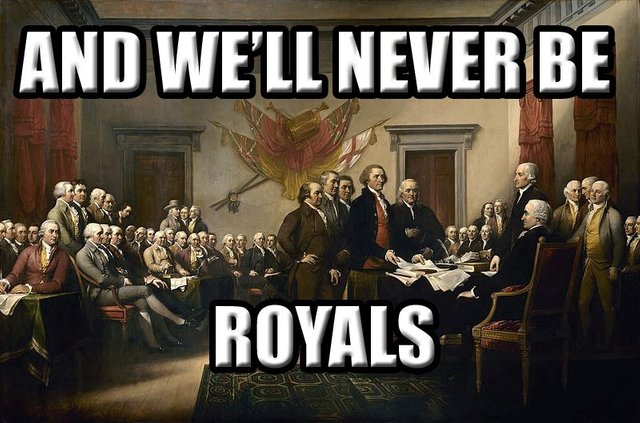
Descartes: Alright we get it man, you are not for a powerful and overreaching government. But I think we all need to admit, those words from section 192 and such, so closely mirror those of the Declaration of Independence, that they really should have at least cited you in their bibliography or something!
All three break into laughter as the clock strikes 2. They realize how late it is and begin getting ready to end the debate for the night. Socrates comes back over with some coffee for them all.
Socrates: Haha looks like this boxing match is over? So who will be crowned champion? A collective “Shut up Socrates” is yelled from the three.
Bacon: Ok I don’t get it, what was the point of all this man? Begging us to come here and debate, when u knew we would never reach an agreement. Besides you barely listened! You joined in for all of 10 minutes!
Socrates: Yeah… arguing just isn’t really my thing. I just ask the questions (chuckles). Oh by the way, Plato’s not really doing any work back there. He could’ve came and joined in the discussion too; Instead he’s just sitting there in the office in front of the cameras watching and listening to your dialogue. Supposedly he wrote down every last word of it. He says he’s going to add it to his next collection or something, calling it the allegory of the 3 irate old men…. I told him to at least call you guys philosophers, but then again I’m not sure what he’s actually writing in that thing. You’d have to ask him, because this time, for real, you know I know nothing!
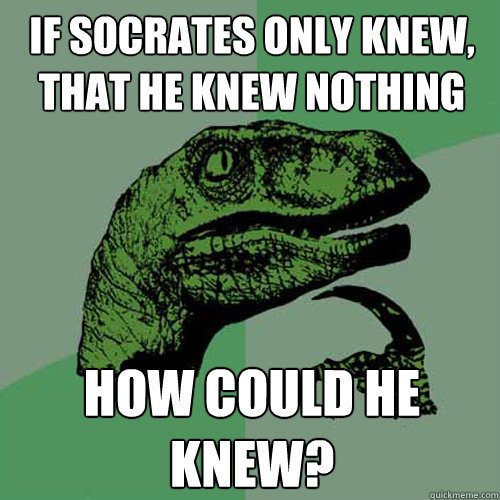
Socrates’s designed experiment, which hoped to reach a common conclusion, clearly did nothing close to that. Epistemologically, Francis Bacon and John Locke subscribe to the same school of thought. However, they could not convince Descartes or even Socrates that an inductive model on the issue was the viable one. Descartes believed in the dualistic separation of the mind and body; however, he was unable to prove that the diminished significance he attributes to the body is the correct view on our existence. Both camps were able to use modern advances, topics, themes, and even entertainment, to try and prove their point. Yet when it came down to it, all the modern examples in the world could not fog up what their main stances were; when their arguments were boiled down, it was clear neither was convinced. Swaying off topic at times, the issue of the government they were all now jointly living under was posed. This was Locke’s forte, and he aimed to clarify some common misconceptions people have regarding his ideas. One could argue that at least with this issue, an agreement seems to have been articulated. So maybe Socrates was effective in forcing some kind of progress, even if it was not in the specified area of debate. Ironically enough, Socrates called for such a debate, just like he did centuries before, posing the tough questions, yet swiftly removing himself as a source for the solution; having the series of questions lead them to a belief or answer. Epistemologically, they are no closer to agreement than they first were. One might say this makes Socrates the most “enlightened” of the group; he knew his lack of knowledge and never aimed to answer the questions himself. Who knows though, maybe this Socratic debate planted the seeds necessary to reach agreement in the near future; one thing’s for sure, Socrates sure doesn’t!
-Dialogue recorded and written by Plato
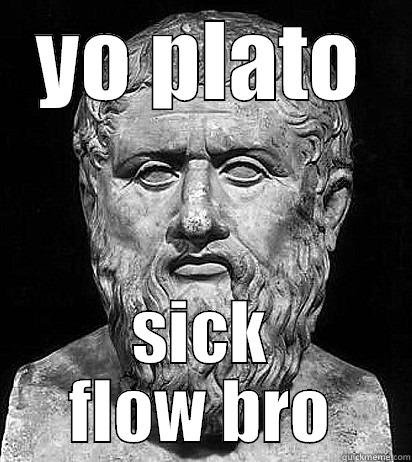
Congratulations @thefeetofpete! You have completed some achievement on Steemit and have been rewarded with new badge(s) :
Click on any badge to view your own Board of Honor on SteemitBoard.
For more information about SteemitBoard, click here
If you no longer want to receive notifications, reply to this comment with the word
STOPCongratulations @thefeetofpete! You have received a personal award!
Click on the badge to view your Board of Honor.
Do not miss the last post from @steemitboard:
SteemitBoard World Cup Contest - The results, the winners and the prizes
Congratulations @thefeetofpete! You received a personal award!
You can view your badges on your Steem Board and compare to others on the Steem Ranking
Vote for @Steemitboard as a witness to get one more award and increased upvotes!